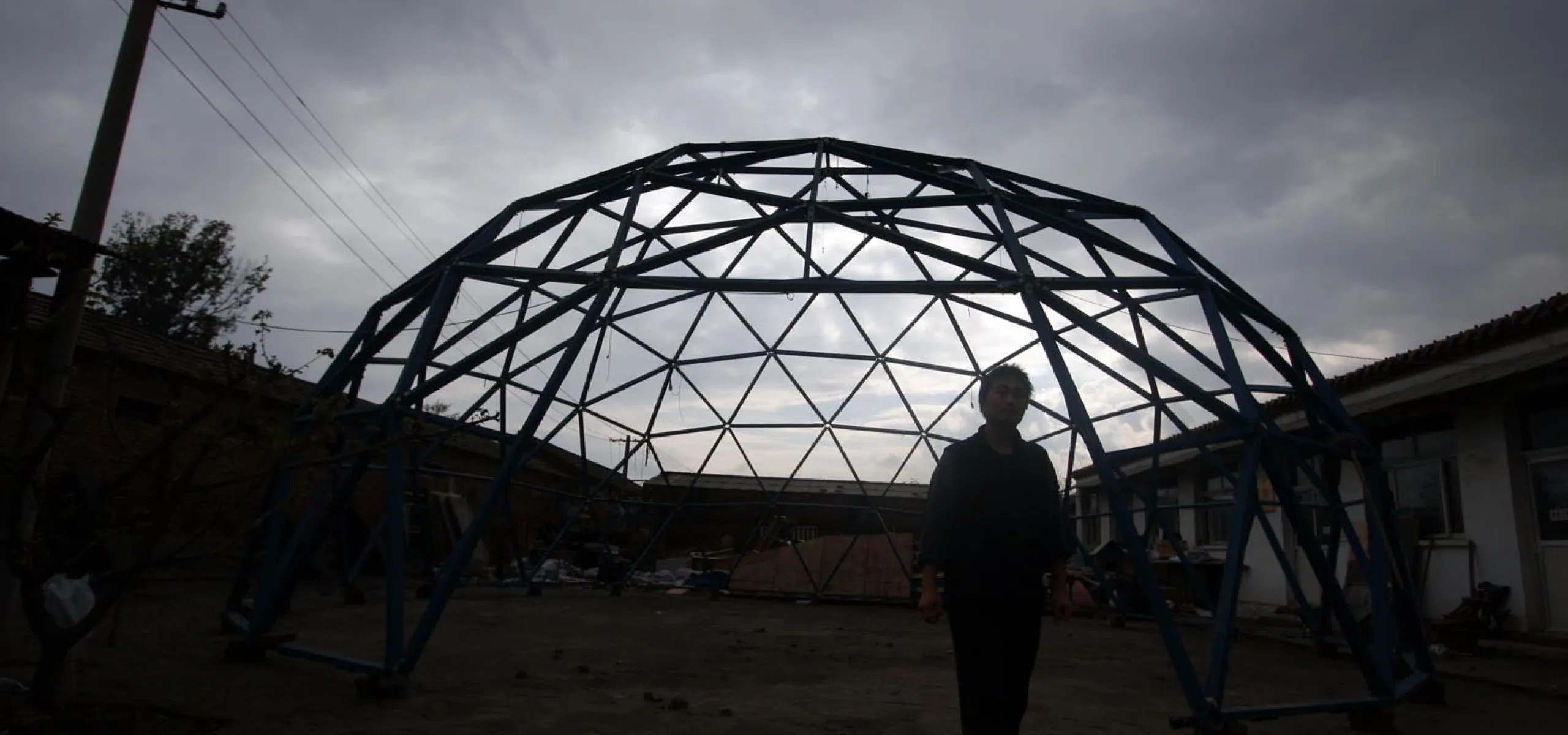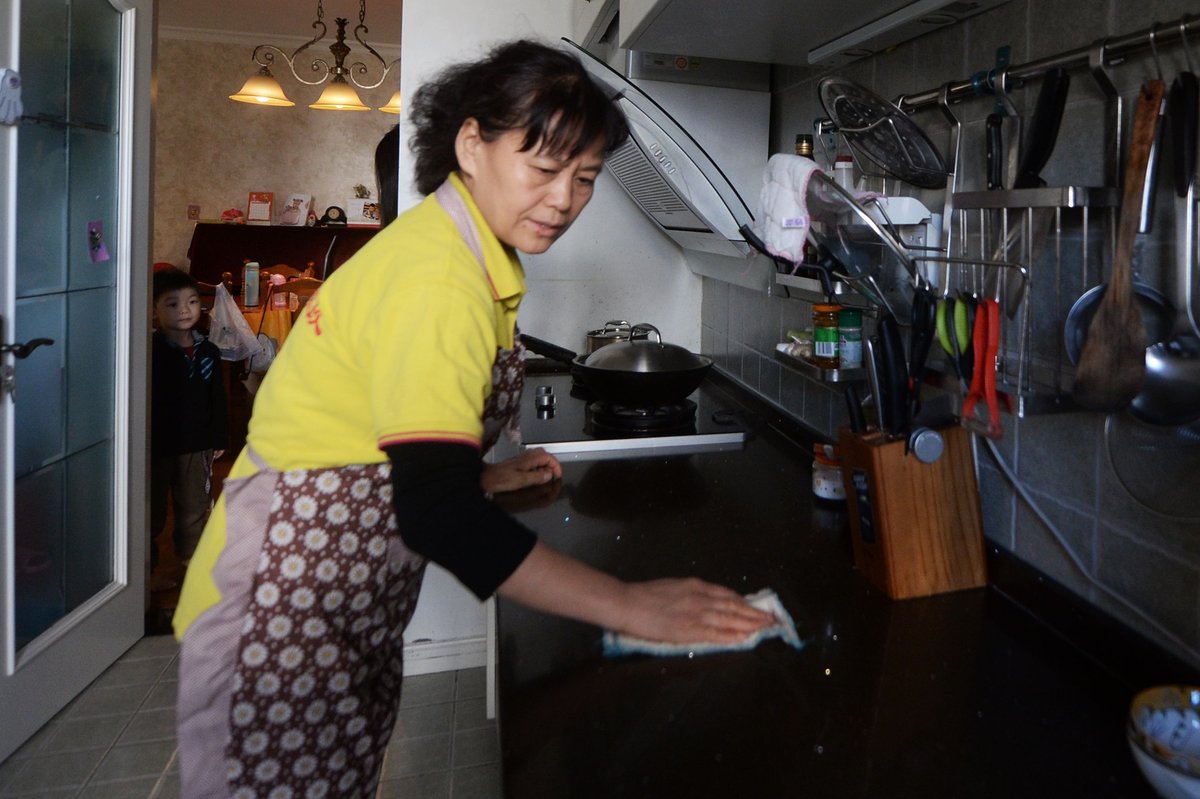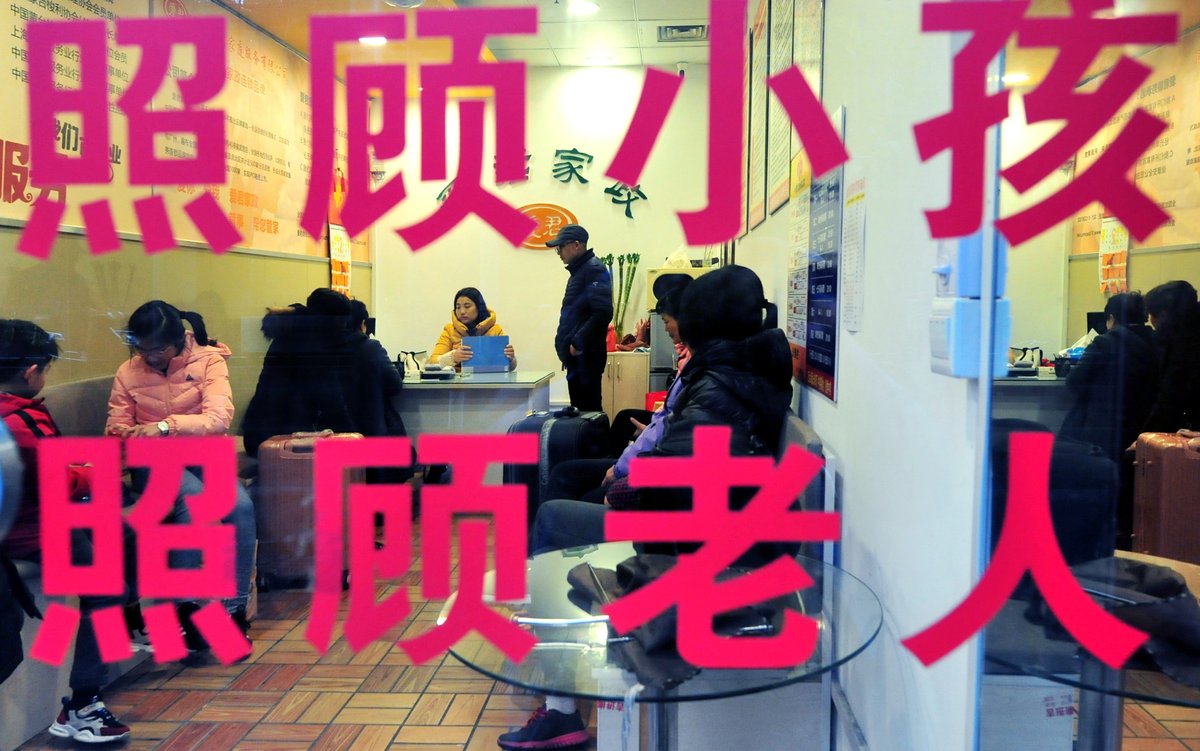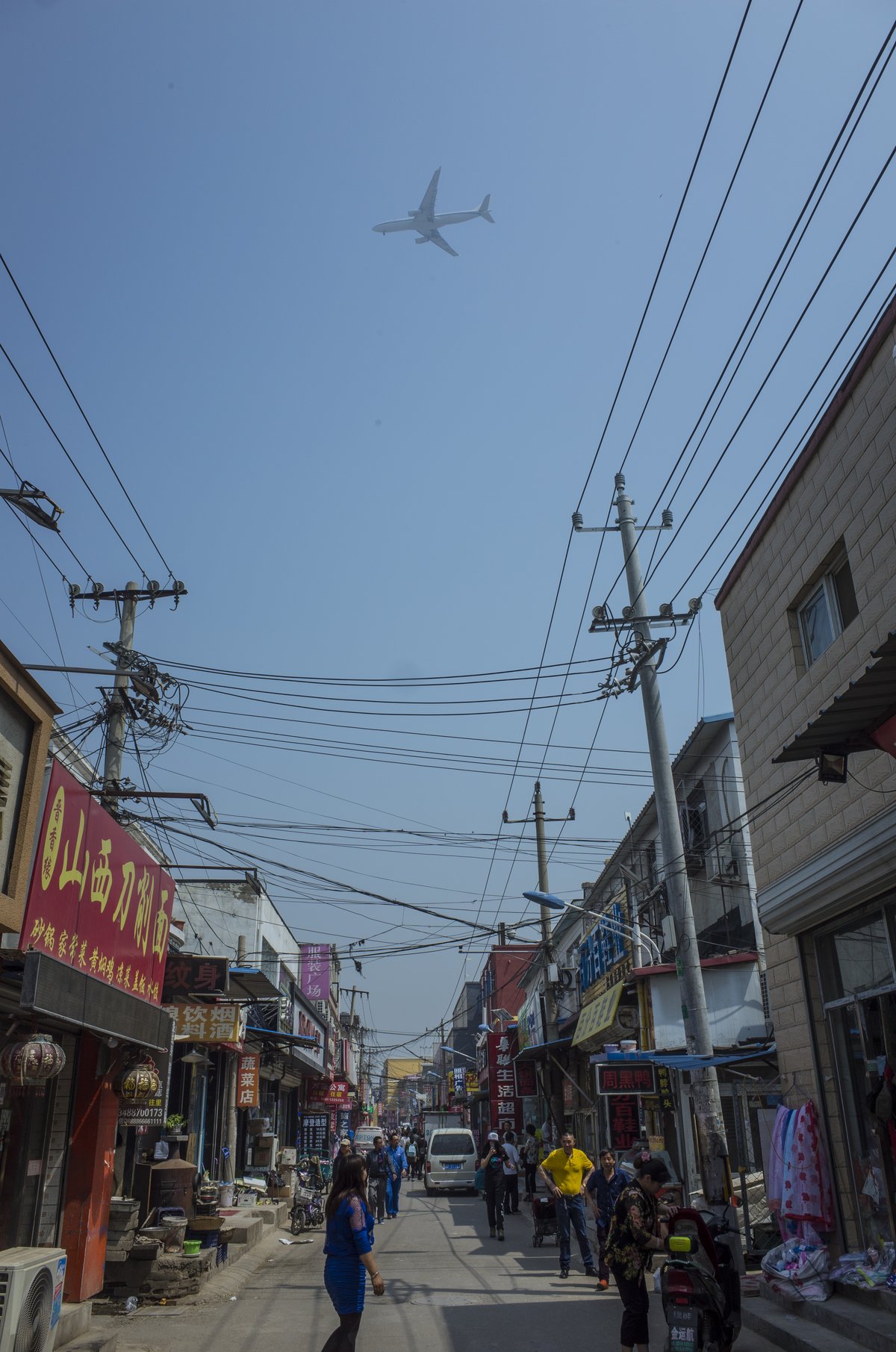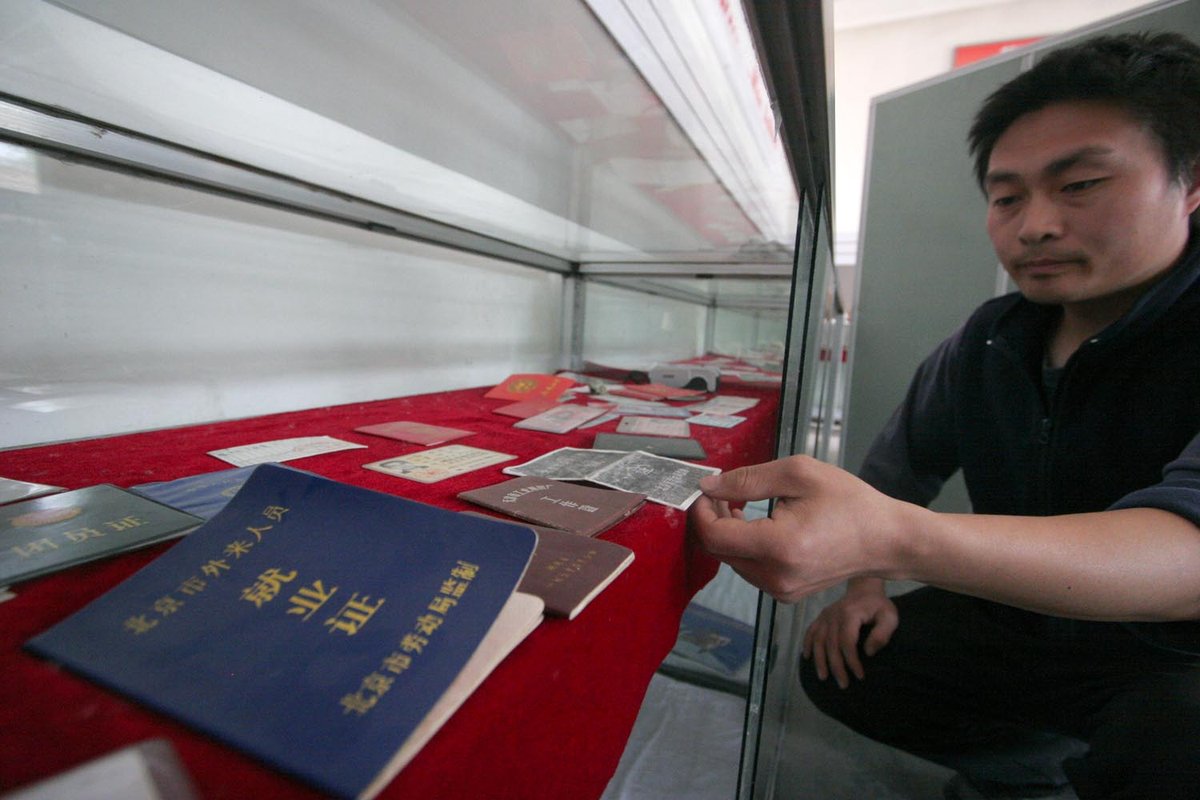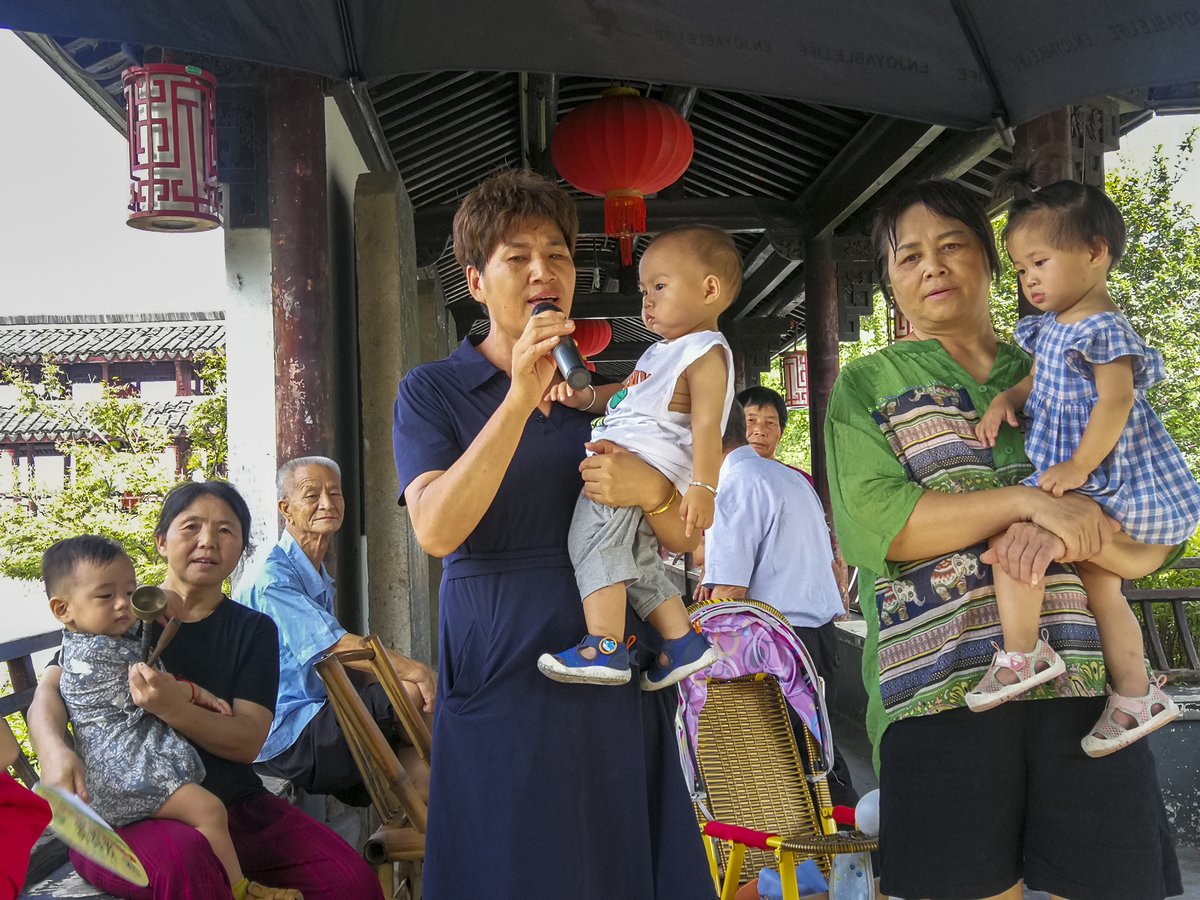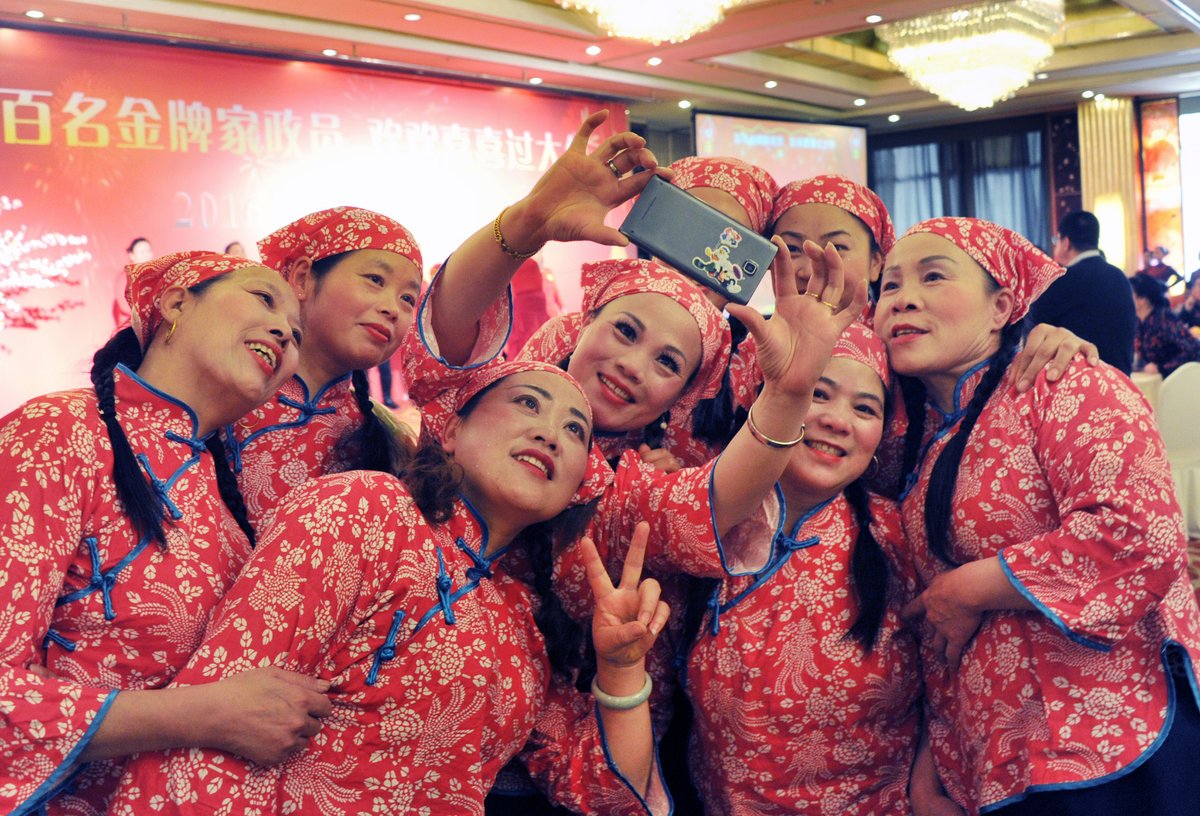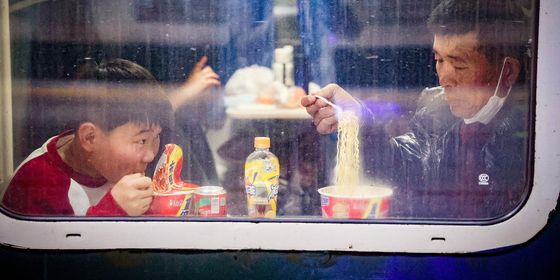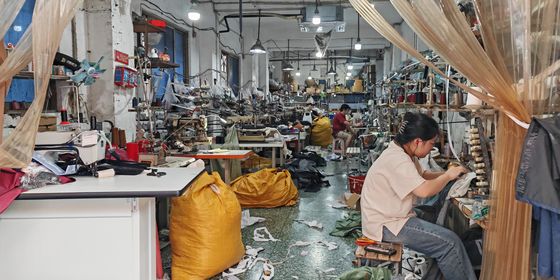Leaving behind an abusive marriage, a migrant worker from the countryside discovered a literature club and reignited her dreams of writing
1/7
It was only the start of April, but Mengyun was already sick of being in her hometown. She felt like there was a fire burning in her heart, that couldn’t be quenched by her daily routine of walking from the living room to the firewood shed, from the back garden to the stove.
In March, her employer had told her, tactfully, that she and her husband were both working from home, so their salaries were being reduced by half; and their son was going to be old enough to start kindergarten soon. Mengyun took the hint right away: She was about to lose the nanny job she’d held for three years.
It had been two months since she had returned to her hometown, and she felt like she was sitting still while her savings dwindled away. She had gotten used to the nonstop rhythm of working and earning money. Shortly after she came home, her right arm began to hurt. It was the consequence of years of holding children in her arms. Her left knee bothered her, and she lost one of the molars on her right side. A machine in a factory will develop problems when it is forced to stop operating; people are no different.
But what Mengyun really couldn’t bear was the atmosphere in her hometown. When she’d first come home before the Lunar New Year, her husband and mother-in-law both came over to look at what she’d dragged back in her suitcase. They didn’t imagine it was full of books. Her mother-in-law grunted and walked away, as if she’d gotten a lottery ticket saying “Thank you for your participation.” Her husband, however, snorted with laughter. “What are you doing with this useless junk? Don’t you think it’s heavy?”
Mengyun tried to explain that she had joined a literary group for migrant workers in Beijing. Every week, university professors, writers, and editors would give them lectures. There were even professors from Peking University. Hadn’t he heard of PKU? Didn’t he know how hard it was to get in? With her teachers’ encouragement, Mengyun had picked up a pen to write her own stories. Some were even published on the group’s WeChat account. The books she’d brought home were all gifts from her teachers. She was usually too tired to read them after looking after the kids and doing housework all day, but she insisted on bringing them home. She was sure she would have time to read them after she retired.
Her husband was impressed by the words “Peking University.” But hearing them from his wife’s mouth felt like a joke. Sometimes, when Mengyun had a free moment at home, she would pick up some paper in order to write a few words, and her relatives would poke fun, “Hey, you’re really gonna be a writer?” Her husband would guffaw along with them. Buoyed by the crowd, he felt brave enough to laugh at his wife.
Toward the end of March, their son brought home good news: His girlfriend of several years had agreed to get married by the year’s end. The two families met several times to negotiate, and the girl’s family’s bottom price was a gift of 20,000 yuan from Mengyun’s family to use for a down payment for an apartment in the city. Mengyun’s family had no choice but to agree. Her son was 30 years old, the oldest bachelor in the city. These years, the price of betrothal gifts in Gansu rarely dropped below 20,000 yuan, plus a separate down-payment for an apartment. Mengyun thought the other family had been generous enough, so she prepared to herself to return to Beijing to get another job.
2/7
Mengyun is a pen name. She’d come up with it herself. She thought her real name was tacky. When she was young, she’d read novels by romance writer Chiung Yao, who gave all her female characters such romantic names. It was as if their names were an amulet, granting these women the right to fantasize and love. She wanted such a name. Since she liked to daydream, she chose a name made up with the characters for “dream” and “cloud.”
She’d been on the tall side all her life. When she was in middle school, she was already 170 centimeters, standing out like a gangling stalk in a field. People in her village thought it wasn’t proper for a girl to be so tall. Behind her back, they said she was ugly, that she looked like a man, as if she had a rare disease or obtained her height illegally. She couldn’t deal with their censure, so she hunched her back as she walked, as if she could stuff her extra centimeters back into her body.
She was talented in the arts. She read whatever books she could pick up in the village, and liked going to see the outdoor movies playing in the village fields. She could sing the movie’s theme song after watching just once, and would sing it all the way home. She imitated the dancing she saw on TV. Sometimes, when she was alone, she sang and danced in front of the mirror at home. At those times, she realized she was beautiful when she stood up tall. When she married, her husband’s family gave her family 1,600 yuan in betrothal gifts, the highest in the village. Once they’d paid for her, Mengyun thought she belonged to her husband’s family now.
After she married, she worked in the fields all day but earned almost nothing. She had to ask her husband for money to buy everything; she couldn’t even get menstrual pads costing 5 cents a pop if he wasn’t in the mood to give her any money. This made her extra meek and shy around him. Her husband would tell her she was ugly, and her singing and dancing made her uglier; or accuse her of trying to seduce other men. She never sang or danced again.
One day, when her husband was selling apples in the market in town, he sent a message back telling her they were selling out, and to bring more from home. Mengyun hurriedly packed 30 or 40 kilograms of apples on a motorcycle and sped down the road. The dirt roads in the village were full of potholes, and suddenly, a child came running out of the field. Mengyun swerved and fell over, spilling apples everywhere. Fortunately, no one was hurt.
When she finally picked up all the apples and arrived at the market, her husband lit into her for being late: “How are we gonna sell these bruised apples? You stupid bitch, why don’t you go die?” The bystanders all tried to pacify him, saying, “Stop shouting, she’s bleeding!” It was then that Mengyun realized she had skinned her knee, and her blood had stained her pants red.
Back home, Mengyun felt as if a demon had taken over her husband’s body. The demon cursed at her for embarrassing him in town, for ruining the apples. He slapped her across the face. Then he went to take a nap while Mengyun prepared dinner. Over the years, Mengyun was beaten by her husband many times. During her worst beating, she burst her right eardrum, and she has trouble hearing to this day. She thought her husband was in the wrong, but where would she go if she left him? Lots of women in the village suffered more severe beatings than her. By comparison, her husband seemed quite gentle, and he earned enough money for the family to live on, which was better than most husbands.
3/7
In 2007, Mengyun’s husband lost his left leg in a car accident, and could no longer do physical labor. Mengyun decided to go out and find work. At first, he refused to let her, accusing her of wanting to run off with other men. Finally, even his mother grew sick of hearing his obscenities, and intervened: “Who’s gonna earn your children’s school fees? Who’s gonna earn money to take care of me when I’m old and bury me with when I’m dead?” she demanded. It was only then that he agreed.
Mengyun has worked Lanzhou, Yinchuan, Hohhot, and many other cities over the years. The first time she came to Lanzhou, she stood at a zebra crossing, trembling as the cars sped past. But she knew she had no choice but to keep going forward. While working in a beer factory, a crate of beer fell from a high shelf and crushed her big toe. She didn’t complain, even when she saw blood pouring out. She didn’t know the meaning of “workers’ insurance claim,” and was unwilling to spend money to see a doctor. If she didn’t show up for work the next day, they’d cut her pay; so she wrapped her toe in a tissue and continued working. Slowly, as the calluses on her hands grew thicker, her tolerance to pain also grew. Nothing was too heavy for her to lift, and no amount of temperature could send her to the hospital. She dealt with every problem by “letting it be.” She felt her body was like a spring: the more pressure you put on it, the stronger it would get.
From that time on, she began seeing a man in her dreams. She couldn’t see his face clearly, but she knew he was handsome, and that he always wore a kind smile on his face. She dreamed of him once every two or three months, and waited for him to appear like one waits for the next episode of a favorite TV series. One day, she dreamed she was sitting on the bus when a gust of wind swept over her like a tornado. He walked over and helped her close the window. In her dream, she could feel the warmth emanating from his arm. She told him, “Let’s go back to reality together.” But he didn’t answer. Then the bus drove into a forest, she woke up, and couldn’t remember the rest.
Her husband’s temper grew worse. Every time she visited home, he’d accuse her of shacking up with other men in the city, shouting at her until she cried. Then he would come over and give her a back rub. She thought her husband must have been unhappy. He was like a toothless caged beast, still keen to show he was king of the jungle yet afraid of being abandoned, so he was taking out his frustration on her. Once, between puffs of smoking, he told her that he’d seen on TV someone who was sentenced to three years in prison for breaking another person’s eardrum. Now he knew that he’d been wrong to hit her. When she heard this, Mengyun burst into tears.
In 2017, Mengyun found a job for her husband as a security guard in the local town, and rode a long-distance bus for 18 hours to Beijing to become a live-in nanny. She had one goal: to earn two to three times as much money as she could in any other city. She was 49 years old.
4/7
Three years later, Mengyun lost her nanny job. At home, she read messages in nanny-recruitment WeChat groups every day with titles like, “Nanny wanted urgently in Beijing.” She had experience, and she figured demand would be high since many nannies were stuck in their hometowns due to the pandemic. It was a no-brainer. She packed her suitcase, left home, and went to her old employer’s home to collect her things.
Her employer’s son ran into her arms as soon as she opened the door. “Ayi! Why haven’t you come to see me in so long?” She’d cared for the boy for three years, ever since he was a baby. So it was little wonder that, when she’d collected all her things and was preparing to walk out the door, he didn’t understand, and asked her, “Where are you going?” Fighting back tears, she told him she had to work. “Then come back after you finish working,” said the boy, blinking innocently. She nodded.
Other nannies had warned her not to get too attached to the employers’ kids, or she would be sad when she had to leave. Yet she couldn’t help loving this boy. Her employers were a young couple, who always spoke to her kindly. When they were at work, she watched Peppa Pig when the boy watched it, played with him on the floor when he played. Day by day, she could see him growing like the crops in the village. How could she not feel proud of him? She couldn’t pronounce words well in standard Mandarin, so sometimes she had the boy open his educational books and teach her, and she felt as if she’d become a child again herself.
It was by taking care of this boy that she realized what children needed in order to grow: painstaking attention and self-confidence. She could barely remember how she managed to raise her own son and daughter to adulthood. They had run wild in the village as children, were given food and clothing, but there was no such thing as “psychological well-being.” Once they were old enough to take care of themselves, they were sent out into the world to work. She never really found out what they thought or felt in their hearts. Her daughter was more outgoing, her son more introverted and awkward in front of strangers. She thought that if she could go back in time, she’d raise her own children the way she was raising her employer’s child now.
That night, she dreamed of her employer’s child. She was holding him in her arms, and he said he had a tummy ache. She searched for medicine everywhere and found a small brown bottle, but when she looked again, the boy had become herself as a child, and the bottle was empty. Mengyun woke with a start, and realized she was sleeping on the floor in a dormitory with a dozen people. She felt like a fallen leaf that had been washed away by a stream—she couldn’t remember where she was.
Thinking hard, she recalled that several hours ago, she had been dragging her suitcase around the streets outside, searching for the new employment agent’s office. Her phone had run out of battery, and she was lost. Standing on the overpass with the cars honking and speeding below her, she felt like an ant that was about to be drowned by an incoming flood. Eventually, by asking other people for directions, she’d found the employment agency’s office, which was simply an apartment where all the nannies slept when they were off work.
She couldn’t go back to sleep, so she recalled a poem that she had written with several other women at Hongyan Home, a charitable organization. It went like this:
I’m a Hongyan mother,
I have two children.
One calls me Ayi,
The other is about to have her own child.
When they were recording the song, she had gotten a voice-recording of her employer’s son saying “Ayi” and asked them to include it in the track. He was a smart kid; his “Ayi” was loud and clear as a bell. At that moment, she could hear him calling her “Ayi” again.
5/7
The pandemic had more severe impacts than anyone had imagined. Lots of hotel housekeepers lost their jobs, so they were competing for nanny positions too, but fewer families were hiring. Those “Urgent” job notices frequently turned out to be scams, where you were asked to pay a “training fee” of a few thousand yuan up front. Mengyun slept on the floor of the employment agency for two weeks and still hadn’t found a job. Another woman asked her if she wanted to work in a senior home. The job paid about half the salary of a nanny, but it was better than nothing, so she accepted.
Without a job, Beijing felt even more cold and alien than usual. Over the years, Mengyun’s feelings toward the city had been in a constant state of flux. When she had some savings, she regretted not coming sooner; when things weren’t going well, when people were rude to her, she thought she ought to leave after a couple of years. But whenever she recalled the first time she went to Picun village, her face would light up. She said she was like a bee who had been flying into walls inside a dark tunnel for years, and found there was a light at the end of it, with a pasture of flowers beyond.
At her old job, she had every Saturday off, and could explore the city. But at first, when she stepped out of her employer’s apartment, she didn’t know which way to walk. Beijing was too big, and she didn’t belong in any corner of it. One day, Mengyun searched the words “Beijing, migrant worker, groups” on her phone, and discovered Picun Workers’ Home. On their WeChat account, she read many wonderful essays, all written by migrant workers, whose unpolished yet sincere prose felt like they had come from her own heart.
She wanted to go to and see them, so one Saturday, she rode the bus to two hours to a village on the outskirts of the city. The derelict houses made her heart sink—was this really Beijing? Even her home village looked neater. But when she walked inside the organization’s courtyard, she was delighted to find a library, a museum, and a theater, all for migrant workers. A young volunteer told her that there would be a small lecture organized by the literature club at 7 in the evening—“free of charge.” How was she going to kill time until then? The youth handed her a copy of Yu Hua’s novel, To Live.
That evening, she listened to the lecture eyes reddened from crying after reading the tragic novel. She was also able to meet some of the people whose works she’d read on the WeChat account. They were all migrant workers who spent most of the year away from home, dressed in plain clothes and crowded into a ramshackle room, yet this thing called “literature” made their spirits glow. Mengyun felt she had found people who understood her, who knew the complex feelings in her heart. She walked over to a man who had published many essays on the WeChat account, and said, “I’ve read your works, I think you’re really good at writing.” It was the first time she’d ever talked to a man on her own initiative.
The lectures were typically held on Saturday night, since some of the workers had to work on the weekends. One night, the whole group was ecstatic to welcome a PKU professor to give a talk. It was 10 p.m. after the talk ended, and the professor offered to give Mengyun a lift home, since they lived in the same district. Mengyun shook her head hurriedly. At her employer’s home, she always reminded herself not to overstep her place. A PKU professor must belong to the same class as a county governor back home—how could she let such an important person drive her? The professor smiled and said, “Don’ t worry, we’re all friends now.” That simple phrase kept her up half the night.
Before the Lunar New Year, the literature club held the “Laborers’ Literary Awards.” Because Mengyun was tall and good-looking, and spoke well, the club nominated her to host the award ceremony. As she stood in front of the crowd, with everyone’s eyes on her, she felt for the first time that she was beautiful. Later, her performance with the other women at Hongyan Home was featured on CCTV News. By then, all the painful memories of the villagers’ gossip, her husband’s beatings, the hopeless pressure of making a living had dissipated. For the first time, Beijing had acknowledged her beauty.
6/7
Her husband no longer beat her, since he now knew that domestic violence was illegal. Plus, Mengyun was the family’s breadwinner now. Once he said to her, “My wife is so pretty, so smart and hardworking, yet I used to beat her. I’m such a loser.” But when he lost his temper, he would forget all that and hurl his old insults at her.
Mengyun, though, was no longer the meek wife of old. She knew she could survive on her own without him. Now, he was afraid of her leaving him. With this newfound confidence, she simply ignored his slurs and continued doing housework while singing in her heart. Yet just as Beijing gave her confidence and hope, it gave her a hard reality check at the same time.
After her stint as an award show host, everyone told her that with her looks, she should try to become a model. She decided to give it a try. One Saturday, she went to a pageant for senior-age models, and paid an entry fee of a few hundred yuan—the most money that this woman, who was usually too thrifty even to buy fruits, had ever spent on herself. The other contestants were about the same age as herself, and many weren’t as tall or good-looking. Yet they all had trunks full of qipao, make-up, and high heels that transformed them as soon as they’d dressed up. Mengyun was wearing a white embroidered dress her daughter bought her five years ago—the best clothes she had—and a pair of old canvas sneakers. Competing with these urban pensioners, she didn’t stand a chance, but she set her jaw and walked up and down the stage as the judges watched.
On the subway ride home, Mengyun reflected that all artistic pursuits required a person to invest time and money. At her age, and with her background, this was nearly impossible for her. This was a hard truth for her to accept, but she had to acknowledge that if she wanted to become a good writer, she had to spend a lot of time reading and writing; if she wanted to dance, sing, or model, she had to buy equipment and spend many hours at practice. A nanny who could sing, dance, write, and host award ceremonies impressed people. But maybe they were impressed only because she was a nanny, and there was compassion mixed in with their praise.
One year, when she was returning to Beijing after the Lunar New Year, her husband took her to the train station in Xi’an. They arrived several hours before the train’s departure time, and her husband said, “We’ve never traveled anywhere together. Let’s go see the city walls.” In the ticket line, when he found out that entry for two people cost 100 yuan, his hands shook a little.
With his artificial leg, he couldn’t walk very fast. Rather than tourists, they looked like two people who’d lost their way. Mengyun thought that these ancient walls had seen centuries of people live and die, and perhaps it was her fate to be together with her husband at that moment. Whatever hope and glory Beijing could give her ultimately did not belong to her. But however badly her husband had treated her before, their lives were now bound up with one another’s. After they climbed down from the wall, they said their goodbyes and parted ways. As she walked toward the train station, Mengyun looked back and saw her husband slowly disappear into the crowd, dragging his artificial leg. On the train, she wrote a poem:
Watching your form recede,
Stumbling a little,
I cannot stop the tears streaming down my face.
The walls of Xi’an are long,
So long that we could not reach the end.
It wasn’t as good as the stuff written by professionals, but Mengyun treasured it. She sent the poem to her husband, and he didn’t poke fun or call her “childish.” Instead, he replied, “It’s good.”
7/7
Many of the residents in the senior home were paralyzed and bedridden, unable to take care of themselves. To save time, some of the care staff would feed them through a nasal tube, jamming the tube forcefully into their nose. Mengyun couldn’t stand to watch this. When it was her turn to feed the residents, she would feed them spoonful by spoonful, wiping their chin in between. Other people laughed at her and tried to persuade her to stop, but she wouldn’t listen.
An oppressive silence pervaded the air of the home. From their beds, the residents would sometimes breathe a long sigh. The staff were also quiet. The entire place felt like a silent black-and-white film. Mengyun thought of her home village—with all the young people doing their utmost to make a new life in the city, and the older generation dying out, perhaps it was similarly quiet now.
She had frequent nightmares in the senior home; she would dream that she was back in the village at a funeral, and everyone was dressed in mourning clothes. She would think of family members she’d lost in recent years, and feel pain in her heart. Suddenly, the corpse would jump out of the coffin and demand, “Where are you going?” To Beijing, she’d reply, heart beating in her chest. “Beijing is too far, too big!” the corpse would sigh, and jump back into the coffin.
After a few weeks in the senior home, the employment agency called her saying there was a new nanny position available. The new employer’s house was bigger and had a bigger family, so the work would be harder. Mengyun didn’t hesitate. Nanny jobs paid more, and moreover, she couldn’t stand the atmosphere in the senior home, which made her feel like her own life was ebbing away. Before she left, Mengyun went to the bedside of a resident she frequently cared for to say goodbye. The old woman couldn’t speak, and could only clutch the hem of Mengyun’s clothes with her fingers. Mengyun felt herself tear up. She felt the same regret she always felt when leaving home: that she was taking herself to a gleaming metropolis, leaving all pain and failures behind.
Mengyun is now busier than ever. She gets up at 6 to make breakfast, and works until 11. Besides the couple who hired her, their elderly parents also frequently give her tasks to do. During the day, she rarely has time to look at her phone, to say nothing of writing essays and poems. Yet she’s thankful to her employers for giving her the job. In these years, Mengyun has developed her own observations about Beijingers: They have a low tolerance for pain; they’d go to the hospital for a sniffle or a scratch; they’re more apt to be anxious; their brains were better-developed but their bodies were weak. In the city, people retired at 60, but in her home village, there was no such thing as retirement. Her mother and mother-in-law still worked in the fields in their 80s. Perhaps death was their only form of retirement.
Sometimes, she felt the unfairness of all this. But then she would think, perhaps people in the countryside suffer more, so they have hardier spirits and a more tenacious will to live. Maybe that’s a kind of fairness after all. This thought comforted her. With it, she was able to let go of her unrealized dreams. Sometimes she even felt homesick, and imagined that one day, if she could no longer work, she would go back to the village and finish all those books her teachers had given her to read.
One night, Mengyun was out walking with her employer’s child in her arms. Strolling amid the neon lights and bustling crowds of the city, she had a sense of déjà vu. She’d suffered, yet she also had many blessings in her life. Perhaps the people around her wouldn’t notice her sufferings. We all tend to focus on the good in other people’s lives, all like to think that the grass is greener on the other side. Nobody but ourselves can understand our own pain and struggles. It suddenly occurred to her that the people in the crowd might mistake her for the child’s own grandmother, and perhaps envy her. Perhaps they’ll say to themselves, look, there goes a happy woman.
Written by Mi Laifu (米来福)





